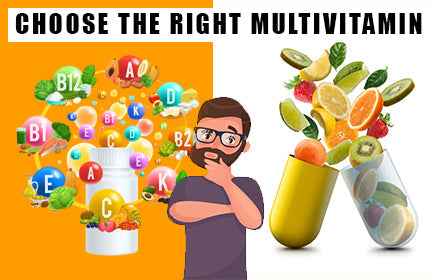Supplements for Eye Health
Of all the organs in the human body, the eyes are perhaps one of the most complex. The eyes need many different vitamins and minerals to function correctly, and certain conditions such as diabetic retinopathy, age-related macular degeneration, glaucoma, and cataracts can impact one’s eyes. With all these conditions, nutritional factors appear to play a significant role. So, in this article, we will be examining supplements, which, according to studies, play a paramount role in maintain eye function.
B Vitamins: B1, B2, B3, B6, B9, and B12
Several B vitamins have been shown to have a positive effect on eye health, including B1, B2, B3, B6, B9, and B12.
In a 2015 study, researchers investigated the effect of B6, B9, and B12 and one’s levels of homocysteine [1]. It is known that raised levels of homocysteine are associated with glaucoma and age-related macular degeneration [2]. The researchers concluded these vitamins could lower one’s homocysteine levels; consequently, reducing the chance of age-related macular degeneration.
In a 2009 study, researchers directly investigated the effectiveness of B6, B9, and B12 in a trial, including 5442 female patients [3]. Patients were randomly assigned to a control group, which received a placebo, or a supplement group which received vitamin B6, B9, and B12 supplementation. After an average of 7.3 years of treatment, the researchers found participants in the supplement group had a 34% reduced risk of developing age-related macular degeneration [3].
To summarize, though these two studies have shown vitamin B6, B9, and B12 supplementation may lower one’s levels of homocysteine, which, in turn, could decrease one’s chances of macular degeneration, further clinical trials are necessary to make this idea more concrete.
Riboflavin, vitamin B2, has also been shown to help with eye health because, as an antioxidant, riboflavin could reduce oxidative stress on one’s eyes.
According to the National Institutes of Health, long-term, severe deficiency of riboflavin can lead to cataracts. However, if the cataracts are still in their early stages, riboflavin supplementation can “easily” reverse them [4], but it is unlikely to change cataracts in their later stage.
A 1995 study found a 31-51% lowered risk of cataract development when participants consumed 1.2-2.2mg of riboflavin per day, instead of .08mg per day [5]. Therefore, since riboflavin plays the role of an antioxidant, studies have shown its consumption can lead to a decreased risk of developing cataracts.
Niacin, also known as vitamin B3, has also been shown to assist in maintaining eye health because, like riboflavin, niacin can act as an antioxidant.
In a 2018 study, researchers investigated aspects of one’s diet and their risk of developing glaucoma. The researchers found niacin may play a preventative role with glaucoma development because there was an association between a low dietary intake of niacin and one’s risk of glaucoma [6].
In 2017, researchers conducted an animal study investigating high doses of niacin and cases of glaucoma and concluded the results from their study “supports therapeutic use of vitamin B3 in glaucoma and potentially other age-related neurodegenerations” [7].
However, it is essential not to consume too much niacin. When people have consumed high amounts of niacin, 1.5-5 grams per day, for an extended period, they risk experiencing adverse effects such as macular damage, inflammation of the cornea, and blurred vision [8] [9].
Finally, research has shown vitamin B1, thiamine, may be effective at reducing one’s risk of developing cataracts [27] [28], and in a 2009 study, researchers found supplementation of 100mg of thiamine three times a day reduced the amount of albumin in one’s urine, which is an indication of diabetic retinopathy in patients with type-2 diabetes [29].
Vitamin E
Because several eye conditions are believed to be a result of oxidative stress [10] [11], the antioxidant vitamin E may help to prevent oxidative damages.
In 2001, researchers conducted a seven-year, randomized, placebo-controlled study investigating the effects of nutrient supplementation and age-related macular degeneration. The supplement group took 400 IUs of vitamin E per day, among other supplements, and the researchers found this supplementation could reduce the risk of age-related macular degeneration by 25% [12].
Additionally, in a 2015 study investigating the relationship between vitamin E and the risk of developing age-related cataracts, the researchers found that dietary and supplemental vitamin E intake, along with high body levels of tocopherol, “might be significantly associated with reduced ARC [age-related cataracts] risk” [13].
Vitamin A
Many studies have shown vitamin A plays three roles regarding eye health.
First, vitamin A is a component in the protein rhodopsin, which helps the eye see in low-light conditions. Consequentially, vitamin A deficiency has been liked to xerophthalmia, which is essentially night blindness. After xerophthalmia occurs, if the vitamin A deficiency is not resolved, the tear ducts and eyes can dry out. Afterward, the cornea will soften, resulting in irreversible blindness [14] [15].
Second, vitamin A supplementation’s relationship with age-related cataracts has been investigated. A 2015 meta-analysis found an inverse relationship between vitamin A levels and one’s risk of cataracts [16], and a 2001 study found a diet high in both B vitamins and vitamin A supplementation was associated with a reduced risk of developing cataracts [17].
Third, vitamin A supplementation’s relationship with age-related macular degeneration has also been investigated. A 1994 study found consuming antioxidants, such as vitamin A, C, E, and zinc, was associated with a substantially reduced risk of age-related macular degeneration in older people [18].
Vitamin C
Similar to vitamin E, vitamin C is a powerful antioxidant which may decrease the effects of oxidative stress on the eyes.
In two studies noted above [12] [18], the researchers investigated combinations of supplements and their effect in maintaining eye health. In those studies, vitamin C was one of those supplements.
In 2001, researchers conducted a seven-year, randomized, placebo-controlled study investigating the effects of nutrient supplementation and age-related macular degeneration. The supplement group took 500mg of vitamin C per day, among other supplements, and the researchers found this supplementation could reduce the risk of age-related macular degeneration by 25% [12].
Also, a 1994 study found consuming antioxidants, such as vitamin A, C, E, and zinc, was associated with a substantially reduced risk of age-related macular degeneration in older adults [18]. Additionally, research shows vitamin C is used by the body to create collagen, a protein that provides structure for the cornea and sclera [19].
A 1999 study published in The American Journal of Clinical Nutrition found vitamin C supplementation may decrease one’s chance of developing cataracts [20], and a 1991 survey investigating various levels of vitamin C supplementation found a dose of 490mg versus 125mg reduced one’s risk of developing cataracts by 75% [21].
Likewise, a 1992 study, including 50,828 women, found long-term vitamin C supplementation may decrease the risk of cataracts by 45% [22].
Omega-3 Fatty Acids
I have reviewed some of the benefits of omega-3s in my article titled “Fish Oils, Omega-3s, EPA and DHA: A Review of Benefits.”
DHA is one type of omega-3 fatty acid, and the cell membranes in the retina hold a large concentration of DHA [23]. Also, omega-3s themselves have anti-inflammatory properties which have been shown to play a role in the prevention of diabetic retinopathy, the most common cause of vision loss amount people with diabetes and a leading cause of blindness among working-age adults.
In a 2018 meta-analysis of 31 studies, researchers found the Mediterranean diet, a diet high in fish, may be correlated to a decreased risk of diabetic retinopathy [24]. Further, two studies found omega-3 supplementation reduced the occurrences of dry eyes, which can cause dryness, discomfort, and blurred vision [25] [26].
Carotenoids: Lutein and Zeaxanthin
Lutein and zeaxanthin are found in the retina and macula of the eye, and they may play a role in filtering harmful blue light [30].
A 2014 study found “Lutein and zeaxanthin supplementation is a safe strategy for improving visual performance of AMD patients” [31], and a 2017 survey found lutein and zeaxanthin consumption may be associated with reduced risk of age-related macular degeneration [32].
In a 2003 double-blind, placebo-controlled study, researchers found 15mg of lutein supplementation three times a week for two years resulted in improved vision in patients with age-related cataracts [33].
Conclusion
My goal in this article was to educate you on various supplements which can help maintain eye health. These supplements included B1, B2, B3, B6, B9, and B12, vitamins E, A, and C, omega-3 fatty acids, and the carotenoids lutein and zeaxanthin.
If you are interested in trying any of these supplements, Healthmasters offers products containing these nutrients.
Vitamin B1 and B2: Healthmasters' B Complex
Vitamin B3: Healthmasters’ Vascular Relaxant
Vitamin B6: Healthmasters’ Corticare B6 B6
Vitamin B9: Healthmasters’ Folate Max
Vitamin B12: Healthmasters’ Sublingual B12 (Methylcobalamin)
Vitamin E: Healthmasters’ Vitamin E
Vitamin A: Old-Fashioned Cod-Liver Oil
Vitamin C: Healthmasters’ Vitamin C
Omega-3 Fatty Acids: Healthmasters’ Norwegian Omega 3
Lutein: Healthmasters’ Eyesight
Zeaxanthin: Healthmasters’ HEMMLA
If you have any questions about any of these products, please call our office at 800.726.1834.
References:
[1] https://www.ncbi.nlm.nih.gov/pmc/articles/PMC4508850/
[2] https://www.nature.com/articles/6703061
[3] https://www.ncbi.nlm.nih.gov/pubmed/19237716
[4] https://ods.od.nih.gov/factsheets/Riboflavin-HealthProfessional/
[5] https://academic.oup.com/aje/article-abstract/141/4/322/212488
[6] https://www.ncbi.nlm.nih.gov/pubmed/29565276
[7] https://www.ncbi.nlm.nih.gov/pubmed/28209901
[8] https://www.ncbi.nlm.nih.gov/pmc/articles/PMC4458328/
[9] https://www.ncbi.nlm.nih.gov/books/NBK114310/
[10] https://www.ncbi.nlm.nih.gov/pubmed/18249249
[11] https://www.ncbi.nlm.nih.gov/pubmed/8895822
[12] https://www.ncbi.nlm.nih.gov/pubmed/11594942
[13] https://www.ncbi.nlm.nih.gov/pubmed/25591715
[14] https://ods.od.nih.gov/factsheets/VitaminA-HealthProfessional/
[15] https://www.britannica.com/science/vitamin-A-deficiency
[16] https://www.ncbi.nlm.nih.gov/pubmed/25194611
[17] https://www.ncbi.nlm.nih.gov/pubmed/11438049
[18] https://www.ncbi.nlm.nih.gov/pubmed/16380590
[19] https://www.ncbi.nlm.nih.gov/pubmed/11006506
[20] https://academic.oup.com/ajcn/article/69/6/1086/4714888
[21] https://www.ncbi.nlm.nih.gov/pubmed/1985409
[22] https://www.ncbi.nlm.nih.gov/pubmed/1392884
[23] https://www.ncbi.nlm.nih.gov/pmc/articles/PMC3206354/
[24] https://www.ncbi.nlm.nih.gov/pmc/articles/PMC5764236/
[25] https://www.ncbi.nlm.nih.gov/pmc/articles/PMC3874521/
[26] https://nei.nih.gov/health/dryeye
[27] https://www.ncbi.nlm.nih.gov/pubmed/10711880
[28] https://www.ncbi.nlm.nih.gov/pubmed/15824226
[29] https://www.ncbi.nlm.nih.gov/pubmed/19057893
[30] https://www.ncbi.nlm.nih.gov/pubmed/22465791
[31] https://www.ncbi.nlm.nih.gov/pubmed/25515572

